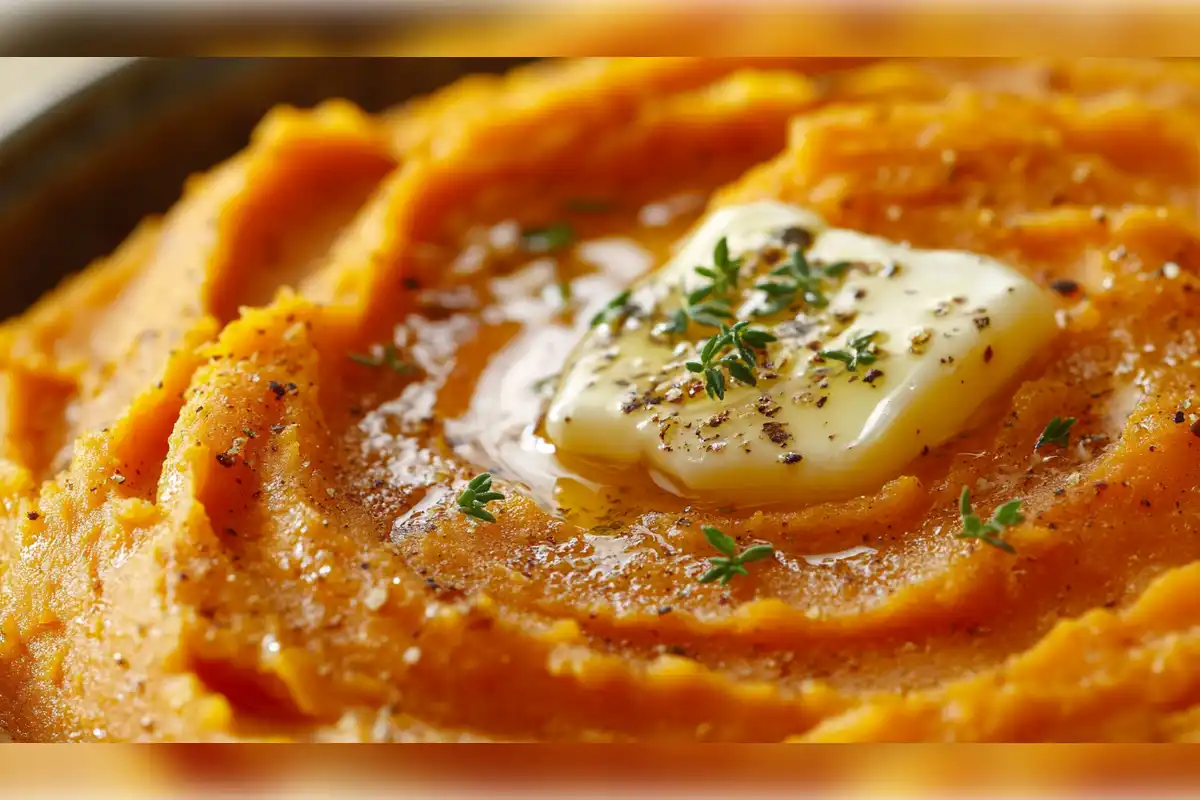Mashed sweet potatoes are a delicious side dish that complements many meals. However, they can sometimes turn out too watery, leading to a less appealing texture. In this article, we’ll explore how to make mashed sweet potatoes less watery, ensuring they have the perfect creamy consistency every time. By following these tips and techniques, you’ll be able to avoid common pitfalls and enjoy beautifully textured mashed sweet potatoes.
Why Do Mashed Sweet Potatoes Become Watery?
Understanding the root causes of watery mashed sweet potatoes is essential to preventing the issue. Here are the main factors:
1. Over-Boiling the Sweet Potatoes
One of the most common reasons for watery mashed sweet potatoes is over-boiling. When sweet potatoes are boiled for too long, they absorb too much water, which affects the texture when mashed.
2. Using Too Much Liquid During Mashing
Adding too much milk, cream, or butter can also lead to a runny consistency. It’s essential to use these ingredients sparingly and add them gradually during the mashing process.
3. Inadequate Draining
Not draining the sweet potatoes thoroughly after boiling can leave excess water in the potatoes, making them overly moist when mashed.
4. Wet or Overly Ripe Sweet Potatoes
Sweet potatoes that are overripe or have been stored in humid conditions tend to have more moisture, which can make the mash watery.
Best Techniques to Avoid Watery Mashed Sweet Potatoes
To ensure you get the perfect consistency every time, here are the best techniques to avoid watery mashed sweet potatoes:
1. Bake Instead of Boil
Baking sweet potatoes is one of the most effective methods for avoiding a watery mash. Baking allows the sweet potatoes to cook in their own moisture without absorbing excess water. Here’s how to do it:
- Preheat your oven to 400°F (200°C).
- Pierce the sweet potatoes with a fork and bake them for 45-60 minutes, or until soft.
- Peel and mash the baked sweet potatoes.
By baking instead of boiling, you eliminate the risk of adding water to the potatoes, resulting in a more consistent and thicker mash.
2. Steam the Sweet Potatoes
Steaming sweet potatoes is another alternative to boiling that helps retain their texture. Steaming uses less water and ensures that the sweet potatoes don’t become waterlogged:
- Cut the sweet potatoes into chunks and place them in a steamer basket.
- Steam for 20-30 minutes until tender.
- Drain any excess moisture and proceed with mashing.
3. Use a Potato Ricer or Hand Masher
For a thick and smooth texture, avoid using a blender or food processor, as these can break down the potatoes too much and release excess moisture. Instead, use a potato ricer or hand masher. These tools allow you to control the consistency and avoid over-processing the potatoes.
4. Add Liquids Gradually
When adding milk, cream, or butter, do so gradually. Begin by adding a small amount and gradually increase until you reach the desired consistency. This helps avoid making the mash too watery.
5. Drain Excess Water Thoroughly
After boiling or steaming the sweet potatoes, let them sit in a colander for a few minutes to drain any excess water. You can also place them back in the hot pot for a few minutes to let steam evaporate, ensuring that no extra moisture remains.
Common Mistakes to Avoid When Making Mashed Sweet Potatoes
Even with the best intentions, certain mistakes can lead to watery mashed sweet potatoes. Here are some common mistakes and how to avoid them:
1. Overcooking the Sweet Potatoes
Sweet potatoes should be cooked until they are just tender. Overcooking them causes them to absorb too much water, resulting in a runny mash. Always test the potatoes with a fork to check for doneness.
2. Using Cold Butter or Cream
Adding cold butter or cream can create a lumpy and inconsistent texture. Always use room temperature or slightly warmed ingredients to ensure a smooth, creamy mash.
3. Adding Liquid Too Early
Avoid adding any liquids (milk, cream, etc.) before you start mashing. Begin by mashing the potatoes on their own, and then slowly incorporate the liquids to prevent the mash from becoming too thin.
4. Mashing Too Much
Over-mashing sweet potatoes can break down their structure and release too much starch, making them watery. Use a gentle hand when mashing to avoid this. For another sweet potato-based dish, check out the Ruth Chris Sweet Potato Casserole recipe.
Techniques to Thicken Mashed Sweet Potatoes
Even with the best techniques, you might still end up with runny mashed sweet potatoes. Here’s how to thicken them:
1. Simmer to Reduce Moisture
If your mashed sweet potatoes turn out watery, place them back on low heat and simmer, stirring constantly. This will help evaporate excess moisture.
2. Add a Thickening Agent
You can add thickening agents such as potato starch, cornstarch, or flour to absorb excess moisture. Start with a tablespoon, mix thoroughly, and add more if necessary.
3. Add More Sweet Potatoes
Adding more sweet potatoes is another effective way to thicken the mash. This works particularly well if you have additional sweet potatoes available.
4. Bake to Dry Out Excess Water
Spread the mashed sweet potatoes in a shallow dish and bake at 325°F (160°C) for 10-15 minutes. This method dries out excess moisture and thickens the consistency without affecting the flavor.
How to Store and Reheat Mashed Sweet Potatoes Without Losing Texture
Once you’ve made the perfect batch of mashed sweet potatoes, storing and reheating them correctly is key to maintaining their creamy consistency. Here are the best methods to ensure they stay thick and delicious:
1. Proper Storage Tips
To keep your mashed sweet potatoes fresh and avoid them becoming watery:
- Refrigeration: Place the mashed sweet potatoes in an airtight container and store them in the refrigerator for up to 3-4 days.
- Freezing: If you’re storing them for a longer period, freezing is an option. Allow the mashed sweet potatoes to cool completely, then transfer them to a freezer-safe container. Freeze for up to 3 months. Be sure to leave some space in the container for expansion.
2. Reheating Mashed Sweet Potatoes Without Losing Texture
Reheating mashed sweet potatoes can be tricky, as it may lead to excess moisture. To avoid this, follow these tips:
- Stovetop Method: Place the mashed sweet potatoes in a saucepan over medium heat. Add a small amount of butter or cream to help restore the creamy texture. Stir continuously until heated through.
- Oven Method: For larger quantities, reheat mashed sweet potatoes in the oven at 350°F (175°C) for 20-30 minutes. Cover the dish with foil to prevent drying out, but remove it for the last 5 minutes to allow excess moisture to evaporate.
- Avoid the Microwave: While microwaving is quick, it often results in a watery texture. If you must use the microwave, heat in small increments and stir frequently to avoid moisture buildup.
By storing and reheating mashed sweet potatoes correctly, you’ll preserve their texture and avoid runny results.
FAQ
Based on common questions found in the “People Also Ask” section, here are some detailed answers:
How do I prevent mashed sweet potatoes from being runny?
To prevent mashed sweet potatoes from being runny, avoid over-boiling them, use baking or steaming methods instead, and add liquids such as cream or milk gradually. Always drain the potatoes thoroughly before mashing and consider using a ricer or hand masher instead of a blender.
How do you thicken mashed sweet potatoes after they’re cooked?
You can thicken mashed sweet potatoes by placing them on low heat to evaporate excess moisture or adding a thickening agent such as potato starch, cornstarch, or flour. Alternatively, you can add more sweet potatoes to balance the texture.
What is the best way to cook sweet potatoes to avoid watery mash?
Baking or steaming sweet potatoes is the best way to avoid watery mash. These methods retain the natural moisture of the potatoes without adding excess water, unlike boiling, which can make the potatoes too soft and waterlogged.
What are some quick fixes for runny mashed potatoes?
Quick fixes include simmering the potatoes on the stovetop to evaporate moisture, adding a thickening agent (such as cornstarch), or baking the mash in the oven to dry out excess liquid. You can also try adding more sweet potatoes or mixing in dry ingredients like breadcrumbs.
Can you overcook sweet potatoes for mashed potatoes?
Yes, overcooking sweet potatoes can make them too soft and waterlogged, leading to a watery mash. To prevent this, boil or steam the sweet potatoes just until tender, then drain them thoroughly before mashing.
What ingredients should I avoid to keep my mashed potatoes thick?
To keep mashed potatoes thick, avoid adding too much liquid (milk, cream, etc.) all at once. Also, avoid using cold butter or cream, as this can lead to an inconsistent texture. Instead, always add these ingredients gradually and use them at room temperature.
Can I use a blender for mashed sweet potatoes, or will it make them watery?
Using a blender or food processor to mash sweet potatoes can break down the fibers too much, resulting in a watery, gluey texture. It’s better to use a potato masher or ricer to maintain a thicker, creamier consistency.
Alternative Recipes for Thick Mashed Sweet Potatoes
If you’re looking for ways to elevate your mashed sweet potatoes, here are some alternative recipes that incorporate thickening ingredients to avoid runny results:
1. Mashed Sweet Potatoes with Brown Butter
Brown butter adds a rich, nutty flavor and helps thicken the mash naturally:
- Bake or steam the sweet potatoes, then mash them with brown butter, a splash of cream, and a pinch of salt.
2. Sweet Potato Mash with Parmesan
Adding Parmesan cheese not only enhances the flavor but also helps create a thicker, more robust texture:
- After mashing, stir in grated Parmesan cheese for a savory, thick mash that pairs well with roasted meats.
3. Mashed Sweet Potatoes with Sour Cream
Sour cream adds a tangy flavor and creamy consistency, making it an ideal addition to mashed sweet potatoes:
- Mash the sweet potatoes and fold in sour cream for added richness and thickness.
Expert Tips for Perfect Mashed Sweet Potatoes Every Time
To guarantee the best results every time you make mashed sweet potatoes, follow these expert tips:
- Don’t rush the cooking process: Cook the sweet potatoes just until tender—overcooking leads to water retention.
- Mash gently: Avoid overworking the potatoes to maintain a smooth, thick texture.
- Experiment with thickeners: If your mashed sweet potatoes are too runny, try adding potato starch or other thickening agents.
- Use room temperature butter and cream: Cold ingredients can shock the potatoes and make them more watery.
Conclusion
Making the perfect batch of mashed sweet potatoes with the right consistency is easy when you understand how to avoid the common causes of a watery texture. By baking or steaming the sweet potatoes, mashing them gently, and adding liquid gradually, you can ensure a rich, creamy mash every time. Don’t forget to use the reheating tips to keep the potatoes thick and delicious, even when serving leftovers. With these expert techniques, you’ll never have to worry about runny mashed sweet potatoes again!

